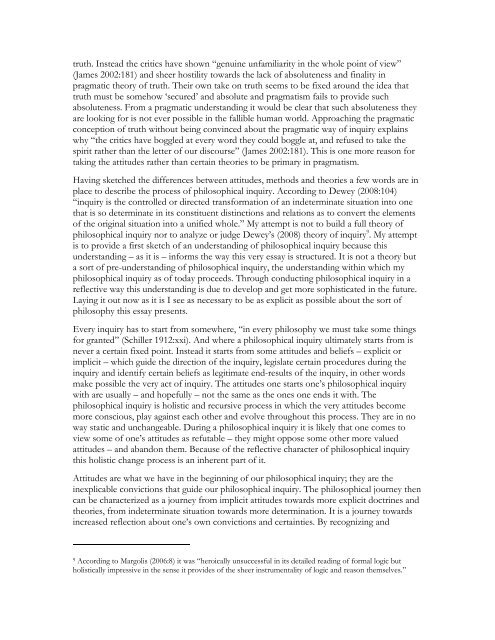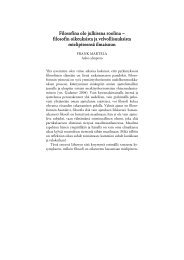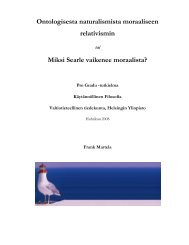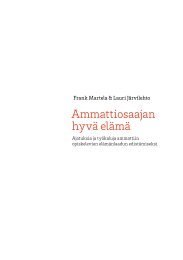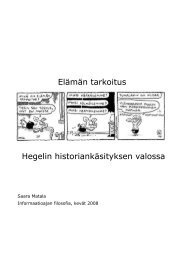Pragmatism as an attitude - Frank Martela
Pragmatism as an attitude - Frank Martela
Pragmatism as an attitude - Frank Martela
Create successful ePaper yourself
Turn your PDF publications into a flip-book with our unique Google optimized e-Paper software.
truth. Instead the critics have shown “genuine unfamiliarity in the whole point of view”<br />
(James 2002:181) <strong>an</strong>d sheer hostility towards the lack of absoluteness <strong>an</strong>d finality in<br />
pragmatic theory of truth. Their own take on truth seems to be fixed around the idea that<br />
truth must be somehow ‘secured’ <strong>an</strong>d absolute <strong>an</strong>d pragmatism fails to provide such<br />
absoluteness. From a pragmatic underst<strong>an</strong>ding it would be clear that such absoluteness they<br />
are looking for is not ever possible in the fallible hum<strong>an</strong> world. Approaching the pragmatic<br />
conception of truth without being convinced about the pragmatic way of inquiry explains<br />
why “the critics have boggled at every word they could boggle at, <strong>an</strong>d refused to take the<br />
spirit rather th<strong>an</strong> the letter of our discourse” (James 2002:181). This is one more re<strong>as</strong>on for<br />
taking the <strong>attitude</strong>s rather th<strong>an</strong> certain theories to be primary in pragmatism.<br />
Having sketched the differences between <strong>attitude</strong>s, methods <strong>an</strong>d theories a few words are in<br />
place to describe the process of philosophical inquiry. According to Dewey (2008:104)<br />
“inquiry is the controlled or directed tr<strong>an</strong>sformation of <strong>an</strong> indeterminate situation into one<br />
that is so determinate in its constituent distinctions <strong>an</strong>d relations <strong>as</strong> to convert the elements<br />
of the original situation into a unified whole.” My attempt is not to build a full theory of<br />
philosophical inquiry nor to <strong>an</strong>alyze or judge Dewey’s (2008) theory of inquiry 9 . My attempt<br />
is to provide a first sketch of <strong>an</strong> underst<strong>an</strong>ding of philosophical inquiry because this<br />
underst<strong>an</strong>ding – <strong>as</strong> it is – informs the way this very essay is structured. It is not a theory but<br />
a sort of pre-underst<strong>an</strong>ding of philosophical inquiry, the underst<strong>an</strong>ding within which my<br />
philosophical inquiry <strong>as</strong> of today proceeds. Through conducting philosophical inquiry in a<br />
reflective way this underst<strong>an</strong>ding is due to develop <strong>an</strong>d get more sophisticated in the future.<br />
Laying it out now <strong>as</strong> it is I see <strong>as</strong> necessary to be <strong>as</strong> explicit <strong>as</strong> possible about the sort of<br />
philosophy this essay presents.<br />
Every inquiry h<strong>as</strong> to start from somewhere, “in every philosophy we must take some things<br />
for gr<strong>an</strong>ted” (Schiller 1912:xxi). And where a philosophical inquiry ultimately starts from is<br />
never a certain fixed point. Instead it starts from some <strong>attitude</strong>s <strong>an</strong>d beliefs – explicit or<br />
implicit – which guide the direction of the inquiry, legislate certain procedures during the<br />
inquiry <strong>an</strong>d identify certain beliefs <strong>as</strong> legitimate end-results of the inquiry, in other words<br />
make possible the very act of inquiry. The <strong>attitude</strong>s one starts one’s philosophical inquiry<br />
with are usually – <strong>an</strong>d hopefully – not the same <strong>as</strong> the ones one ends it with. The<br />
philosophical inquiry is holistic <strong>an</strong>d recursive process in which the very <strong>attitude</strong>s become<br />
more conscious, play against each other <strong>an</strong>d evolve throughout this process. They are in no<br />
way static <strong>an</strong>d unch<strong>an</strong>geable. During a philosophical inquiry it is likely that one comes to<br />
view some of one’s <strong>attitude</strong>s <strong>as</strong> refutable – they might oppose some other more valued<br />
<strong>attitude</strong>s – <strong>an</strong>d ab<strong>an</strong>don them. Because of the reflective character of philosophical inquiry<br />
this holistic ch<strong>an</strong>ge process is <strong>an</strong> inherent part of it.<br />
Attitudes are what we have in the beginning of our philosophical inquiry; they are the<br />
inexplicable convictions that guide our philosophical inquiry. The philosophical journey then<br />
c<strong>an</strong> be characterized <strong>as</strong> a journey from implicit <strong>attitude</strong>s towards more explicit doctrines <strong>an</strong>d<br />
theories, from indeterminate situation towards more determination. It is a journey towards<br />
incre<strong>as</strong>ed reflection about one’s own convictions <strong>an</strong>d certainties. By recognizing <strong>an</strong>d<br />
9 According to Margolis (2006:8) it w<strong>as</strong> “heroically unsuccessful in its detailed reading of formal logic but<br />
holistically impressive in the sense it provides of the sheer instrumentality of logic <strong>an</strong>d re<strong>as</strong>on themselves.”


